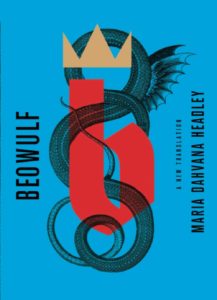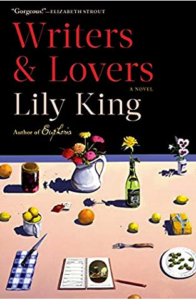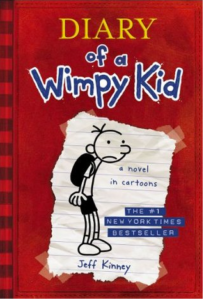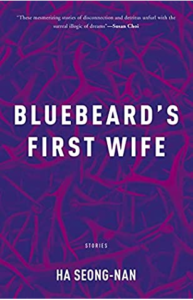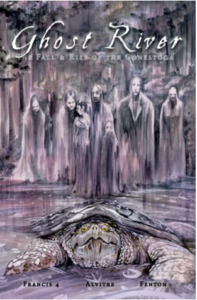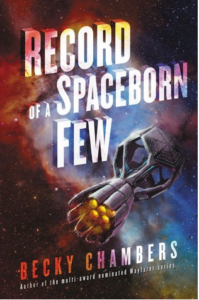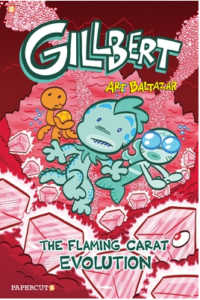I am not a pod(cast)person, but this anthology might change that for me! Or at least get me out of my very narrow lane of go-to things to listen to while wrapping Christmas presents or other visual-heavy artsy-crafty things. I tend to enjoy more radio-drama-type fare like Limetown or, even older than that, Sherlock Holmes stories that actually aired on the radio in the previous century. Which isn’t to say that I haven’t heard of Escape Pod and its sister casts, just that I haven’t had a chance to enjoy it yet, tho its reputation in the field is legendary.
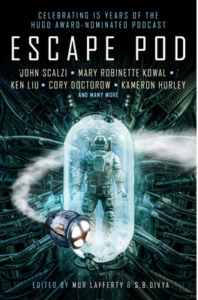 So when I heard that they’d come up with an anthology of fifteen stories to celebrate their fifteen years in operation, I jumped at the chance to sample their wares! Just the author list alone is enough to make the contemporary sci-fi fan salivate, with luminaries such as N. K. Jemisin, John Scalzi and Cory Doctorow among the contributors, alongside perhaps lesser known authors like Tim Pratt and Tina Connolly, who coincidentally provided two of my favorite stories here. Ms Connolly’s Lions And Tigers And Girlfriends was a sweetly hilarious tale of theater kids on a generation ship, and I actually cried when Kai gave a stirring speech to rally her peers in communicating all their anger, hope and fear into storytelling (but also I am a sucker for stories that champion stories.) Mr Pratt’s A Princess Of Nigh-Space was almost a complete 180 in attitude, as a young woman grapples with her grandmother’s legacy: I found it chillingly charming regardless, and a nice upending of the Lost Heir trope.
So when I heard that they’d come up with an anthology of fifteen stories to celebrate their fifteen years in operation, I jumped at the chance to sample their wares! Just the author list alone is enough to make the contemporary sci-fi fan salivate, with luminaries such as N. K. Jemisin, John Scalzi and Cory Doctorow among the contributors, alongside perhaps lesser known authors like Tim Pratt and Tina Connolly, who coincidentally provided two of my favorite stories here. Ms Connolly’s Lions And Tigers And Girlfriends was a sweetly hilarious tale of theater kids on a generation ship, and I actually cried when Kai gave a stirring speech to rally her peers in communicating all their anger, hope and fear into storytelling (but also I am a sucker for stories that champion stories.) Mr Pratt’s A Princess Of Nigh-Space was almost a complete 180 in attitude, as a young woman grapples with her grandmother’s legacy: I found it chillingly charming regardless, and a nice upending of the Lost Heir trope.
Another favorite of mine here was Cory Doctorow’s Clockwork Fagin, which is also my favorite work of his to date. Set in an alternate steampunk reality, it tells the tale of long-suffering orphans living under the petty tyranny of a Dickensian Fagin figure, until a boy just as ruthless as the master comes in and refuses to be abused. I also enjoyed Ms Jemisin’s Give Me Cornbread Or Give Me Death, which imagines a future resistance against a tyranny extrapolated in distressingly logical if pessimistic fashion from the current state of American affairs. Another lively extrapolation of the future was on display in Tobias Buckell’s thoughtful The Machine That Would Rewild Humanity — if things ever come to the pass described in his story, I’m rather inclined to agree with the narrator’s actions (tho I did think it a bit silly that the future society didn’t care about “why” criminals committed their crimes but did care about understanding the criminals, which seem to me integral parts of one another.) Mr Scalzi’s Alien Animal Encounters was a cute/titillating/appalling series of vignettes that ended hilariously in large part due to its verisimilitude. Kameron Hurley’s Citizens Of Elsewhen felt very much of a piece with her excellent novel The Light Brigade, but with an interesting twist that is unfortunately spoiled by the illuminating, perhaps too much so, foreword by Escape Pod’s creator, Serah Eley. I did enjoy Ms Eley’s descriptions of each story, but would probably save the entire foreword for reading after the rest of the book. One thing I did disagree with her tho, was in her characterization of editor Mur Lafferty’s entry here, The Fourth Nail, as a satisfying standalone. It was a good story but definitely felt to me like a chapter from a bigger novel, as did Greg van Eekhout’s Spaceship October. The latter, at least, ended on less of a cliffhanger than the former.

